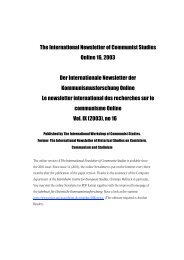VOL. XVI (2010), NO 23 - The International Newsletter of Communist ...
VOL. XVI (2010), NO 23 - The International Newsletter of Communist ...
VOL. XVI (2010), NO 23 - The International Newsletter of Communist ...
Sie wollen auch ein ePaper? Erhöhen Sie die Reichweite Ihrer Titel.
YUMPU macht aus Druck-PDFs automatisch weboptimierte ePaper, die Google liebt.
<strong>The</strong> <strong>International</strong> <strong>Newsletter</strong> <strong>of</strong> <strong>Communist</strong> Studies Online <strong>XVI</strong> (<strong>2010</strong>), no. <strong>23</strong> 87<br />
required a highly co-ordinated all-American movement, and it seemed “ridiculous” to him to<br />
work individually with different Central and South American countries. As to Phillips, the<br />
essential unity <strong>of</strong> the all-American working class movements was supposed to be pointed<br />
out. 35 This narrative coincided with the proposals made by the delegates <strong>of</strong> both <strong>Communist</strong><br />
Parties <strong>of</strong> the USA outlined in the CEIC declaration and published under the slogan <strong>of</strong> a<br />
forthcoming “American Revolution”.<br />
Even while being sure that it was almost impossible to spare a minute in the Soviet leader’s<br />
busy schedule, Phillips insisted on the necessity to meet Lenin personally with the aim to<br />
discuss some problems <strong>of</strong> Latin American Communism. His insistency turned out fruitful as<br />
he was invited to the Kremlin. 36 It was the last and desperate effort made by the Mexican-<br />
American communist to play a prominent role in the development <strong>of</strong> the Spanish <strong>Communist</strong><br />
movement, as he planned to talk not only about Mexico, but also about Spain. However,<br />
Lenin was more interested in the issues <strong>of</strong> the left wing movement in the Western<br />
Hemisphere. And it was this direction where Phillips was sent soon to become part <strong>of</strong> the<br />
apparatus <strong>of</strong> the Pan-American Bureau <strong>of</strong> the Comintern and the Red Trade Unions<br />
<strong>International</strong>. Borodin’s recommendations and commentaries about all the future activity <strong>of</strong><br />
the Panamerican bureau were taken seriously while this structure was formed. Phillips was<br />
the only Spanish-speaking person and he had some acquaintance with Mexico, which was<br />
the main reason to appoint him as general advisor and assistant <strong>of</strong> the Bureau’s chairman<br />
Sen Katayama. 37<br />
Meanwhile, Borodin had had a meeting with Lenin where he presented the report on his long<br />
journey. In summer 1920 he was in constant touch with the Soviet leaders during the<br />
preparation <strong>of</strong> the 2 nd Congress <strong>of</strong> the Comintern. Was the issue <strong>of</strong> a new journey to Spain or<br />
Latin America in the Kremlin’s agenda in those days? Most likely this was not the case. At<br />
that moment, Michael Borodin became one <strong>of</strong> the central figures <strong>of</strong> Moscow’s “big game” –<br />
uncoiling far-reaching activities with the aim to organize an anti-British rebellion in India. 38<br />
However, the lack <strong>of</strong> experienced organizers obliged the Comintern leaders to shuffle the<br />
constellation <strong>of</strong> personnel. Finally, Borodin did not leave for Kabul (despite the decision to<br />
make him a Soviet polpred [plenipotentiary representative] in Afghanistan) where he would<br />
have to work together with Roy, coordinating the anti-colonial efforts.<br />
Borodin (being member <strong>of</strong> the People’s Commissariat for Foreign Affairs) was included into<br />
the Soviet delegation at the conference <strong>of</strong> the World Post Office Union to be held in Madrid in<br />
October, 1920. This diplomatic status was given to him with an obvious aim to camouflage<br />
his main task to organize the adherents <strong>of</strong> Bolshevik revolution. Exactly the same strategy<br />
was used during his trip to Mexico. However, he never succeeded to return to the Pyrenees:<br />
the Spanish government refused to grant visas to the Soviet representatives. Soon after, the<br />
Small Bureau <strong>of</strong> the ECCI sent Borodin to Berlin to work in the Western European<br />
Secretariat <strong>of</strong> the Comintern.<br />
<strong>The</strong> Spanish neophytes <strong>of</strong> communism nevertheless insisted on an illegal visit to their<br />
country by Borodin, and <strong>of</strong>fered to accelerate the journey, as the congress <strong>of</strong> the PSOE was<br />
35 RGASPI, 489/1/24, 43.<br />
36 He wrote in his small note: “Dear Comrade Lenin! <strong>The</strong> next week I should leave for home, but before my<br />
departure I would like to discuss with you about the situation in Mexico and Spain. Will it be possible? Jesús<br />
Ramírez. Delegate <strong>of</strong> the <strong>Communist</strong> Party <strong>of</strong> Mexico to the Second Congress <strong>of</strong> the <strong>Communist</strong> <strong>International</strong>.” (J.<br />
Ramírez to Lenin, September 11, 1920. RGASPI, 5/1/828, 1).<br />
37 RGASPI, 5/2/3, 97-97ob; Shipman, Op. cit., pp. 1<strong>23</strong>-124.<br />
38 See details in: Yu.N. Tichonov: Politika velikikh derzhav v Afganistane i pushtunskie plemena. 1919-1945,<br />
Moskva-Lipeck, Inform, 2007, pp. 42-50.














